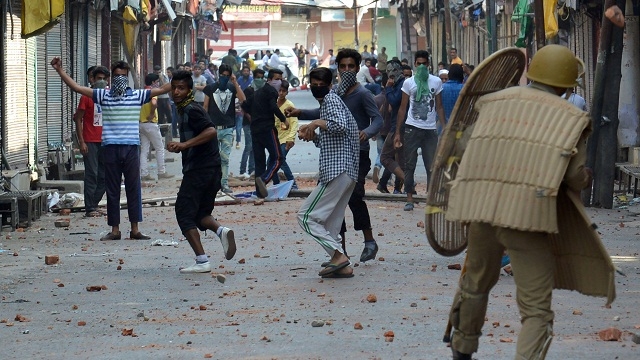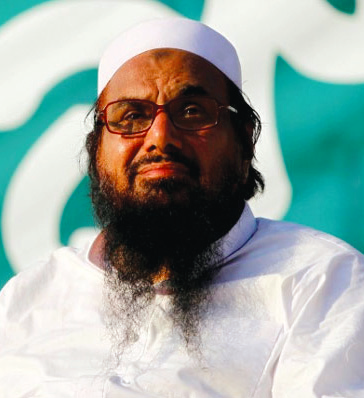
In the absence of any initiative to begin a dialogue process, separatists hone their skills to influence people
There is a lot to unlearn from a recent video clip gone viral on social media. A CRPF man carrying EVMs keeps walking nonchalantly even as he is pushed, heckled and abused by a group of youths shouting anti-India slogans, — a predictive ranting tirade. The clip protagonists seemed to expect some elisions reflected in that part of Kashmir:
a) security forces are used to such gimmickry of protestors; and
b) most youths in the Valley are downright separatists whose writ runs so wantonly.
For outsiders, a message went out: Kashmir is as bad as it has been in last three decades — a perception repeatedly reinforced by a series of violent events. The last year’s post – Burhan Wani’s killing and the death of over 80 people in its wake bear it out. It all climaxed in the lowest voter turnout on Thursday in Budgam, under Srinagar parliamentary constituency, where a re-poll was ordered after April 9’s poor voting figures amid large-scale violence leading to the death of eight people.
“Maybe all sides — mainstream political parties, separatists and those sitting in Delhi and Islamabad — want to tire each other out before realizing the futility of it all,” says a youth in Srinagar, refusing to identify himself.
“The frustration stems from people’s perception of betrayal and the anger is because no dialogue process is initiated — either with Pakistan or with the people’s representatives,” says Junaid Mattu, spokesperson for the National Conference.
The separatists have their own take that essentially revolves around Pakistan. “It is not the fight for votes or power. This is the fight against the betrayal of Indian government for not fulfilling the promises made with the Kashmiri people. It is time to ease tension and ensure stability by settling all disputes,” says Abdul Gani Bhat, executive member in moderate faction of Hurriyat Conference.
The separatists’ poll boycott call was reported from mosques’ loudspeakers, phone calls, WhatsApp and text messages. And despite several requests by the mainstream parties to postpone the polls, the Election Commission deemed it fit to hold elections. “In such an environment, genuine voters would obviously feel frightened,” said an NC activist.
Development a ‘non-issue’
During his recent visit to Udhampur, Prime Minister Narendra Modi asked the people, particularly Kashmiri youth, to choose “tourism over terrorism”. “Had the people of Kashmir devoted the past 40 years to development of tourism, the Valley would have been blessed with numerous benefits,” Modi said at a rally organized to mark South-East Asia’s biggest tunnel along the Jammu-Srinagar Highway.
The separatists were quick to reject the assertion. “Construction of tunnels and roads is futile and won’t succeed to lure us,” said a joint Hurriyat Conference statement.
The failure of the ‘development mantra’ was, in fact, clear from the election manifestoes of all parties during the assembly polls. Predominant issues were: a dialogue with Pakistan, opening new routes along the LoC, restoration of autonomy, demilitarization and revocation of the Armed Forces Special Powers Act. This explains why, after over a year of assembly polls, the separatist camp’s slogans of ‘azadi’ strongly influence the Kashmiri youth.
Poor showing
A senior government officer, who wished not to be named, throws light on areas of concern. “Our education is in a shambles. Out of the 96 degree colleges functioning in the state, at least 31 colleges —some of them sanctioned about nine years back – function from makeshift accommodations. We have poor health infrastructure. Hundreds of villages don’t have electricity and road connectivity. We have the highest number of unemployment in North India. But we have restricted our thought process to unnecessary issues,” he says.
Nawang Rigzin Jora, Congress Legislature Party leader and MLA from Leh, rues that politics has taken over everything else. “There is no commonality among the people of three regions — Jammu, Kashmir and Ladakh. We have to have a binding force, which is not there.”
Mahesh Koul, a research scholar, says by relegating areas of human development, “the government has handed a long leash to the subversives who want the state to waste time in conflict management.”
The situation has come to such a pass, says Prof Hari Om, a Jammu-based historian, that leaders in Kashmir don’t want development. “The three regions — Jammu, Kashmir and Ladakh — are pulling in different directions. And the Indian state simply watches on.”
(Source: Tribune, Chandigarh) – British English




Be the first to comment